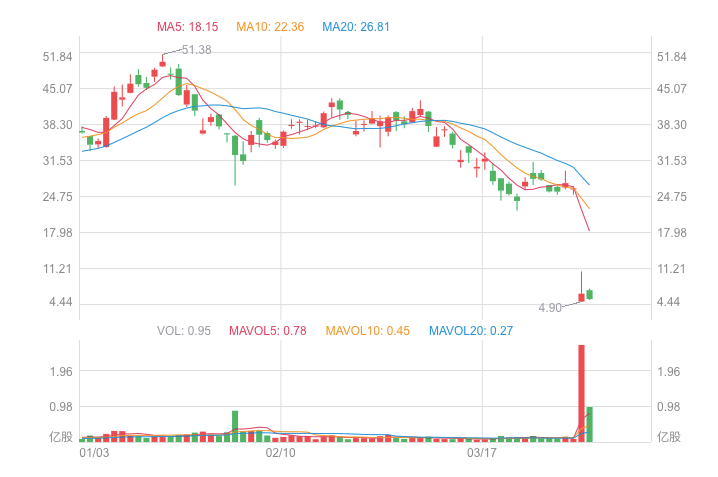How does Ruixing's employees commit fraud of 2.2 billion, and how to use technology to prevent financial fraud?

Text | Edit by Derek | Produced by Bi Tongtong | PANews
Ruixing Coffee's "self-defense financial fraud" incident continued to ferment. This afternoon (April 5), Ruixing Coffee issued an apology letter saying that the executives and employees involved had been suspended for investigation. Ruixing Coffee's board of directors has commissioned a special committee composed of independent directors and appointed third-party independent agencies to conduct a comprehensive and thorough investigation.
Since April 2nd, Ruixing Coffee, a US-listed company, has suddenly submitted to the SEC that the board of directors has established a special investigation committee after discovering problems in the 2019 annual report. The committee found that during the second quarter to the fourth quarter of 2019, the company forged a transaction amount of 2.2 billion yuan, and the costs and expenses increased accordingly.
- The Fed's current rate cut is fundamentally different from the 2008 financial crisis, or may trigger a new round of global central bank interest rate cuts
- An important factor in investing in digital currencies: high liquidity
- Acquired by Binance, is CoinMarketCap still believable?
Public "self-explosive" financial fraud, Ruixing's stock price plunged 75.6% that day, the market value shrank to 1.6 billion US dollars. Overnight, investors thumped their chests, and Ruixing's fake scandal smashed his circle of friends.

Ruixing Coffee US stock price trend

How to falsify 2.2 billion?
How to do up to 2.2 billion financial frauds? The specific details of Ruixing Coffee's financial fraud have not yet been disclosed, but it is estimated based on the previous Ruixing Coffee's financial fraud document published on the muddy platform of the short agency.
The financial and operational data are falsified, and the revenue model of the coffee industry = order volume × quantity per order × unit price. According to the survey of “muddy water”, all three data of Ruixing are exaggerated.
The average expansion rate of orders was 72%, and the daily merchandise sales volume increased by 69% in the third quarter and 88% in the fourth quarter. The actual unit price is exaggerated by at least 12.3%. The actual loss at the store level is as high as 24.7% -28%. Exaggerated advertising expenditures mask actual income.
Company account funds will not lie, and financial fraud will inevitably bring more revenue, but how does the company account fill the gap?
The muddy water report analyzed that by tracking third-party media, Ruixing Coffee ’s third-quarter advertising expenditures were overstated by at least 150%. The extra advertising expenditures in this part just cover up the exaggerated income, thus confusing.
If it is said that such a huge amount of fraud is actually done by COO Liu Jian and several employees, it is unbelievable. After entering China after graduation, following Lu Zhengyao's "faith" for many years, Liu Jian held 1.2% of the shares after the IPO. He did not have a strong incentive to carry out such a huge amount of fraud. Unless he is an undercover sent by a friend. On the other hand, for such fraud, it is also difficult to bypass the various audits of the company's market and finance.
Therefore, many people believe that Liu Jian is at least under the supervision of Ruixing's actual controller to carry out comprehensive counterfeiting work, otherwise it will not be able to get a green light in the company. Until the release of the annual report this year, he had to explode to protect himself.

Financial fraud, how to solve problems in blockchain
For nearly 20 years since the Chinese stocks were listed in the United States, there has been a storm of financial fraud like Ruixing. The founder of Hunshui was originally founded to help his father investigate the Chinese company Dongfang Paper, found the company's problems and sold short, and was inspired to start Hunshui.
The fragile trust sorted out by China Prospective Stock was finally broken by Ruixing. Some investment bankers even said that the Ruixing incident may last for several years and affect the path of US IPOs for Chinese companies.
How to prevent financial fraud through technical means? Blockchain is a path that can be explored.
Blockchain is a decentralized distributed ledger with the characteristics that data cannot be tampered with. Different from a single centralized subject ledger, blockchain technology solves the problem of trust in bookkeeping through a distributed ledger that all participants agree and can verify. Blockchain cleverly uses technologies such as cryptographic P2P network and consensus mechanism, so that the accounting content needs to be confirmed by most participants before it can be recorded or changed. This new accounting method greatly increases the difficulty of modifying the accounting content. Make bookkeeping more credible.
Among enterprise-level blockchain application solutions, blockchain certification business is relatively widely used (invoices, etc.). In order to respond to supervision and ensure the performance of the blockchain system, the alliance chain method is generally adopted.
For example, Ruixing Coffee's sales system runs a complete set of processes such as purchase, sales, and finance on the blockchain through the blockchain system, which can remove friction costs in various links. Unit price, etc., so that the data on the chain cannot be tampered with. However, there is currently no complete blockchain solution for finance, and this solution also requires regulatory promotion to be adopted by related companies.
In fact, related applications and attempts are already in practical exploration. For example, Kingdee Software, which focuses on financial systems, announced the launch of a blockchain-based financial data management platform in November 2018. Kingdee Software will build a trustworthy ecosystem for the enterprise's digital economy and provide blockchain digital services for enterprises.
On the audit side of finance, even the audit company Ernst & Young of Ruixing is applying blockchain technology. In 2014, Deloitte launched a blockchain service that provides consulting services for various departments including the government. Customers build distributed applications and are the first companies in the "Big Four" to develop and apply blockchain technology. In October 2016, Ernst & Young began to cooperate with blockchain enterprises, and in 2017, the application of blockchain technology based on bitcoin settlement audit and consulting service fees was established, becoming the fastest-growing company in the field of blockchain finance.

Blockchain is not a panacea
However, the blockchain is not a panacea. Although the way of combining financial data of the company with the chain can ensure the safety and accuracy of the data on the chain, not all companies have the willingness to add the blockchain to their own business. There are still many problems that need to be solved in the blockchain certificate storage business.
1. Data on-chain is a false demand, and the initiative of enterprise data on-chain is insufficient
For most companies, the existing centralized system can already meet their own business needs. Unless the blockchain can effectively solve the pain points of the industry in a specific field, bring considerable property income, and greatly save the cost of the enterprise, the enterprise will take the initiative. The initiative to seek blockchain + landing is weak.
2. The accuracy of the data on the chain is difficult to guarantee
Blockchain technology can only guarantee the accuracy of the data on the chain, and it is difficult to tamper. However, it is impossible to determine whether the data on the chain is accurate. For enterprises, if there is a motive for tampering with the data, uploading the modified data to the chain can still avoid supervision.
3. Interested but refuse to pay
Most existing blockchain depository platforms are bundled with traditional software system sales and participate in project bidding as a gift function or an additional item. If the enterprise has a relatively complete software system, it is difficult to have the intention to pay. The financial-based blockchain system needs to be promoted by regulatory authorities.
4. Blockchain technology is not yet mature
Since the development of the blockchain, there are still problems such as insufficient throughput and other blockchain expansion problems. It is not yet possible to achieve enterprise-level high concurrency while meeting decentralization.
5. Lack of unified standards
The application of blockchain can be expected in the future, but the current public chain technical standards are not unified, which will bring pressure and challenges to the application migration based on the chain. Establish a national unified public chain standard as soon as possible to ensure that it cannot be tampered with. After the establishment of the national public chain standard, various problems such as interconnection and credibility can be solved.
We will continue to update Blocking; if you have any questions or suggestions, please contact us!
Was this article helpful?
93 out of 132 found this helpful
Related articles
- How does blockchain interoperability bring Bitcoin into the DeFi field?
- What do those who do not use Bitcoin think? Nothing more than these 5 modes of thinking
- Market analysis: the market is oscillating at a high level, waiting patiently for direction signals
- The Secret History of Bitcoin: Those Who Changed Bitcoin
- Everyone talks: believe that our direction is to move forward-Thoughts after reading "Digital Currency: Inheritance and Innovation from Slate Economy to Digital Economy"
- The $ 300,000 bitcoin key was lost and recovered again. A former Google engineer may have discovered a gold mine
- The industry urgently needs Ethereum 2.0, but wants to be "available" for at least 2 years!






